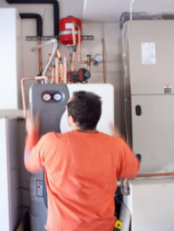Our Long Beach Specialize In Water Heater Repair
Sometimes a water heater will announce  a problem vocally. You really should listen to what it has to say. What's that? You don't speak water heater? That's okay, we do and we've put together a primer on what all those sounds your storage water heater is making mean.
a problem vocally. You really should listen to what it has to say. What's that? You don't speak water heater? That's okay, we do and we've put together a primer on what all those sounds your storage water heater is making mean.
There are plenty of noises that a water heater makes that aren't cause for alarm. These are usually do to the expanding and contracting of the metal parts in and around the tank. Other normal sounds include scale or sediment banging against the side of the tank and making a soft tinking sound. If you have an electric heater you may also hear a slight buzzing sound when it kicks on depending on the accumulation of scale on the heating element. If you hear these sounds constantly it is a good chance that you are going to need to replace your sacrificial anode soon. This is the rod that prevents the interior of the tank from rusting. It does so by chemically combining with the free oxygen in the tank and precipitating. This forms sediment that crystallizes and adheres to all of the interior surfaces of the tank. Flushing your system every few months can eliminate the sediment and scale build-up and keep your water heater working efficiently.
Don't Let Scale Give You the Standing 8 Count
If you start to hear loud banging, gurgling or popping sounds coming from the inside of the tank this is usually caused by sediment heating up and exploding on the interior of the tank. Flushing the tank will eliminate this problem as well. The most common way for this to happen is for scale to build up on an electric heating element. When the element kicks on, it heats the sediment quickly and causes it to burst.
If you hear a boiling sound coming from the inside of your tank, this is a sign of a serious malfunction in either your thermostat or you temperature and pressure release valve. This is an emergency as a highly pressurize tank could lead to an explosion. Call in one of our Long Beach water heater repair associates immediately and, if possible, cut the power to the water heater to prevent further heating.
